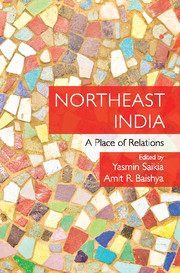Book contents
- Frontmatter
- Contents
- List of Figures
- List of Boxes
- List of Tables
- Acknowledgments
- Introduction
- Section I Contemporary Politics and Issues of Definition
- Section II Creating Presence
- Section III Knowing through Experience
- 7 Dismembered Lives: Narrating History's Footnotes in Aulingar Jui
- 8 Freedom and Frustrated Hopes: Assessing the Jadonang Movement, 1917-1932
- 9 Celebrating a New ‘New Year’ in Tripura: Space, Place and Identity Politics
- Section IV Rethinking Politics
- Glossary
- About the Contributors
- Index
7 - Dismembered Lives: Narrating History's Footnotes in Aulingar Jui
from Section III - Knowing through Experience
Published online by Cambridge University Press: 23 July 2017
- Frontmatter
- Contents
- List of Figures
- List of Boxes
- List of Tables
- Acknowledgments
- Introduction
- Section I Contemporary Politics and Issues of Definition
- Section II Creating Presence
- Section III Knowing through Experience
- 7 Dismembered Lives: Narrating History's Footnotes in Aulingar Jui
- 8 Freedom and Frustrated Hopes: Assessing the Jadonang Movement, 1917-1932
- 9 Celebrating a New ‘New Year’ in Tripura: Space, Place and Identity Politics
- Section IV Rethinking Politics
- Glossary
- About the Contributors
- Index
Summary
History can do without its footnotes. Footnotes are inessential at best; at worst they trip up the greater narrative
– Joe Sacco, Footnotes in GazaThe recent decade has witnessed the publication of quite a few literary works by former United Liberation Front of Assam (ULFA) militants. These works include collections of poems by Megan Kachari, Kaberi Kochari Rajkonwar and Kabirranjan Saikia, memoirs by Rajkonwar, Samudra Gogoi and Mihir Chetia, and novels by Raktim Sarma, Anurag Mahanta and J. Dorjee. While figures like Indira Goswami were instrumental in making these works visible in the Assamese public sphere, detailed critical considerations of such cultural productions in Assamese have generally been lacking. Apart from a few essays in English (Baruah, 2013; Kalita, 2009), the major critical engagement with these works in Assamese appeared in an issue of the literary magazine Satsori titled ‘Bidroheer Xahitya’ (Literature by Rebels, 2012). In his evaluation of the writings, the guest editor of this volume, Areendom Barkataki writes that the expressive style and technique of these writers are weak because their works have been produced away from the mainstream, but that they are powerful testaments nevertheless because the lived experiences of the former militants have helped them forge distinctive voices and unique worldviews (p. 25). The word ‘mainstream’ (mulxuti) and the difference that such literary productions have from this category is repeated thrice in Barkataki's brief discussion. He closes the essay in a slightly apologetic tone saying that while the productions of these writers are definitely of a ‘different quality’ from the mainstream, future critical considerations will help develop new heuristics for evaluating their significance (p. 26). While this essay distances itself from Barkataki's repeated separation of the ‘mainstream’ from such supposedly ‘marginal’ cultural productions, it heeds his call to frame a new heuristic for evaluating these works. In the larger work of which this essay is a part, I claim that the fictions (I focus only on the fictional works) written by former ULFA members [Sarma's Borangar Yan (2007), Dorjee's Bhutanot Heral Dhutiman (2015) and Mahanta's Aulingar Jui (2007)] introduce two new themes into the oeuvre of Assamese literature: first, set in no-man's zones lying between India, Myanmar and Bhutan, these fictions situate themselves within while simultaneously deconstructing the hill-valley (pahar-bhaiyam) distinction, which remains a potent spatial-cultural imaginary in the Assamese ecumene;
- Type
- Chapter
- Information
- Northeast IndiaA Place of Relations, pp. 161 - 180Publisher: Cambridge University PressPrint publication year: 2017



